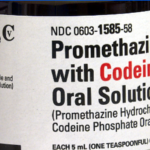What is Lean Drug? 10 Things You Should Know

What is Lean Drug?
Lean, commonly known as purple drank, purp, sizzurp, syrup, wock, oil, and other names, is a recreational drug beverage. It is created by mixing prescription-strength cough or cold syrup that contains codeine and promethazine with a soft drink. This combination results in a potent concoction that is consumed for its intoxicating effects.
The history of lean can be traced back to the 1960s and 1970s in Houston, Texas, where it is believed to have originated in the hip-hop community. The exact origins and the person who first created it are unclear, but it gained popularity in the 1990s and early 2000s through the influence of southern rap music, particularly in the Houston area.
Originally, lean was made using a prescription cough syrup called Promethazine with Codeine, which contains the opioid codeine and the antihistamine promethazine. The syrup was typically mixed with a clear soda, such as Sprite or Mountain Dew, and often combined with Jolly Rancher candies for added flavor.
Lean gained recognition through the music of artists like DJ Screw, Lil Wayne, and Three 6 Mafia, who mentioned it in their lyrics and openly discussed its use. It became associated with a certain subculture, particularly in the southern United States.
Over time, lean developed a reputation as a recreational drug, primarily used for its sedative and euphoric effects. It was also sought after for its ability to induce a feeling of relaxation and detachment from reality. However, the use of lean carries significant health risks, including addiction, respiratory depression, and overdose.
Due to its potential for abuse and the dangers associated with its misuse, the production and sale of cough syrups containing codeine have become more regulated in many countries. This has led to a decline in the availability and popularity of lean in recent years.
What does lean do to your body?
Lean contains codeine, an opioid that acts on the central nervous system. It can induce feelings of euphoria, relaxation, and sedation. Users may experience a sense of detachment from reality. However, opioids can also depress the CNS, leading to slowed breathing, drowsiness, and impaired cognitive function.
One of the most significant effects of lean is respiratory depression. This drink can suppress the activity of the respiratory centers in the brain, resulting in shallow and slowed breathing. This can be dangerous, potentially leading to respiratory failure, lack of oxygen, and even coma or death.
Dangers Associated With Drinking Lean
Here are 10 dangers associated with the recreational use of lean:
1. Respiratory Depression: Lean contains codeine, which is an opioid. Opioids can suppress the respiratory system, leading to slow and shallow breathing. The effects of respiratory depression can include shallow or slow breathing, difficulty breathing, decreased oxygen levels in the blood, and even respiratory arrest in severe cases. This condition can lead to unconsciousness, coma, brain damage, or death if not promptly treated. Rapper Lil Wayne suffered multiple seizures and had a near death experience that was reported to have been triggered by lean.
2. Addiction: Regular use of lean can lead to physical and psychological dependence. Codeine, one of the main ingredients in lean, is highly addictive. Users may develop a tolerance and require higher doses to achieve the desired effects, increasing the risk of addiction. Signs of lean addiction can include increased consumption of the drug, preoccupation with obtaining and using lean, unsuccessful attempts to quit or cut back, changes in behavior and mood such as secrecy and irritability, neglect of responsibilities, and physical and health-related signs such as weight loss, drowsiness, slurred speech, and respiratory problems. It’s important to note that these signs can vary from person to person, and the presence of one or more of these signs does not necessarily confirm an addiction.
3. Overdose: The combination of codeine and promethazine in lean increases the risk of overdose. Lean overdose can have severe and potentially life-threatening effects. Consuming excessive amounts of lean, especially in combination with other central nervous system depressants, can lead to symptoms such as severe respiratory depression, extreme sedation, slowed heart rate, unconsciousness, and cold, clammy skin. Overdose requires immediate medical attention, as it can result in respiratory arrest, coma, brain damage, or even death. If you suspect someone is experiencing a lean overdose, call emergency services right away for prompt medical intervention.
4. Organ Damage: Prolonged use of lean can cause significant harm to vital organs such as the liver and kidneys. The high sugar content in the syrup and the potential for toxic additives can contribute to organ damage and dysfunction. The high levels of acetaminophen found in lean can lead to liver toxicity and potential liver failure, while the codeine content can contribute to kidney damage and decreased kidney function. Additionally, lean abuse can result in respiratory depression, compromising the supply of oxygen to vital organs and potentially causing organ damage or failure.
5. Respiratory Infections: Continuous use of lean can suppress the immune system, making users more susceptible to respiratory infections such as pneumonia and bronchitis. Cough syrup abuse can also weaken the respiratory system, making it more difficult for the body to fight off infections. Lean abuse can lead to various respiratory infections, including pneumonia, bronchitis, upper respiratory tract infections, and lung abscess. The abuse of lean, particularly when combined with other respiratory depressants, weakens the immune system and impairs the respiratory system’s function, making individuals more susceptible to these infections. Symptoms can range from cough, chest pain, and difficulty breathing to runny or stuffy nose, sore throat, and fever.
6. Mental Health Issues: Lean abuse can exacerbate or trigger mental health disorders such as depression, anxiety, and mood swings. It can also impair cognitive function and memory, impacting overall mental well-being. The sedative effects of lean can contribute to feelings of lethargy, apathy, and emotional numbness. Prolonged use can also disrupt the brain’s natural reward system, leading to a dysregulation of mood and an increased risk of developing addiction or substance use disorders. Additionally, the consequences of lean abuse, such as strained relationships that can further contribute to stress, depression, and other mental health challenges.
7. Cardiovascular Problems: The combination of codeine and promethazine can have adverse effects on the cardiovascular system. Lean abuse can lead to cardiovascular complications such as decreased heart rate, low blood pressure, and irregular heart rhythms. The combination of opioids and other sedatives in lean can depress the cardiovascular system, potentially resulting in heart attack, stroke, or other serious cardiovascular events. Additionally, the chronic use of lean can contribute to the development of cardiovascular diseases, including hypertension and heart disease, due to the strain placed on the cardiovascular system over time
8. Gastrointestinal Issues: The high sugar content in lean can contribute to gastrointestinal problems such as constipation, stomach pain, and nausea. Opioids, like those found in lean, can cause decreased motility in the gastrointestinal tract, resulting in constipation and difficulty passing stool. Additionally, the combination of codeine and promethazine in lean can irritate the stomach lining, potentially leading to the development of ulcers. Prolonged and excessive use of lean can exacerbate these gastrointestinal problems, negatively impacting overall digestive health.
9. Interactions with Other Substances: Lean is often mixed with other drugs, such as alcohol or benzodiazepines, to enhance its effects. This practice can lead to dangerous interactions especially when combined with central nervous system depressants. Lean often contains opioids, such as codeine, which can potentiate the sedative effects when taken with other substances like alcohol, benzodiazepines, or sleep medications. These combinations can cause extreme sedation, respiratory depression, and even overdose, as the depressant effects on the central nervous system are compounded. Mixing lean with stimulants, such as cocaine or amphetamines, can also be risky as it can mask the sedative effects, potentially leading to higher doses of opioids being consumed, increasing the likelihood of overdose.
10. Legal Consequences: The recreational use of lean is illegal in many countries due to the presence of controlled substances like codeine. The possession, distribution, and misuse of lean, which typically involves the misuse of prescription medications, is a violation of drug laws in many jurisdictions. These laws vary by country and region, but they generally classify the non-medical use of prescription drugs and the possession of controlled substances without a valid prescription as illegal activities. Legal consequences for the consumption of lean can include fines, probation, mandatory drug education or treatment programs, and in some cases, imprisonment.
It is crucial to understand that lean pose serious health risks, and its recreational use should be avoided. If you or someone you know is struggling with lean abuse, it is important to seek help from healthcare professionals or addiction treatment services.
How to Overcome Lean Abuse
Overcoming lean abuse requires commitment, support, and a comprehensive approach. Here are some steps that can be helpful in overcoming lean abuse:
1. Acknowledge the problem: Recognize and admit that lean abuse is a problem that needs to be addressed. This self-awareness is a crucial first step toward recovery.
2. Seek professional help: Consult with a healthcare professional, such as a doctor or addiction specialist, who can provide guidance and support throughout the recovery process. They can help develop an individualized treatment plan tailored to your needs.
3. Detoxification: Depending on the severity of the lean abuse, supervised detoxification may be necessary to manage withdrawal symptoms safely. Medical professionals can provide appropriate medical support during this phase.
4. Therapy and counseling: Engage in therapy or counseling sessions, such as cognitive-behavioral therapy (CBT), to address the underlying causes and triggers of lean abuse. Therapists can help develop coping strategies, improve decision-making skills, and build a support network.
5. Support groups: Consider joining support groups or 12-step programs like Narcotics Anonymous (NA) or SMART Recovery. These groups offer a supportive community of individuals who are facing similar challenges and can provide guidance, encouragement, and accountability.
6. Lifestyle changes: Adopt a healthy and balanced lifestyle that supports recovery. This includes regular exercise, proper nutrition, adequate sleep, stress management techniques, and engaging in activities that promote physical and emotional well-being.
7. Avoid triggers and temptations: Identify and avoid situations, environments, or individuals that may tempt you to use lean. Surround yourself with supportive people who understand and encourage your recovery.
8. Establish a relapse prevention plan: Work with your healthcare professional to develop a relapse prevention plan that includes strategies for managing cravings, coping with triggers, and maintaining sobriety in the long term.
Remember, overcoming lean abuse is a journey that requires time and effort. It is essential to be patient, and kind to yourself, and celebrate small victories along the way. With the right support, treatment, and determination, recovery from lean abuse is possible.





